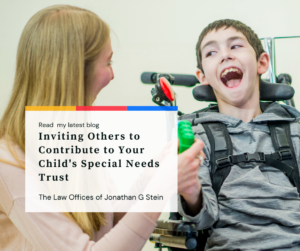 Many parents worry about how they will fund a lifetime of care for their child with special needs. This is especially concerning if the parents are fearful that there will not be enough money left for housing, caregivers, and basic life necessities when mom or dad pass away.
Many parents worry about how they will fund a lifetime of care for their child with special needs. This is especially concerning if the parents are fearful that there will not be enough money left for housing, caregivers, and basic life necessities when mom or dad pass away.
When I meet with parents of children and adults with disabilities, one of the first legal tools that we discuss is a Third-Party Special Needs Trust. A Third-Party Special Needs Trust is a specialized type of trust that allows the beneficiary to utilize the assets and funds in the trust while still maintaining eligibility for public benefits like Supplemental Security Income (SSI) and Medicaid.
Parents are, of course, able to leave their assets to the Third-Party Special Needs Trust when they pass away. The trust can also be listed as a beneficiary for retirement benefits and life insurance policies. However, one overlooked benefit of having a Third-Party Special Needs Trust in place is that the trust can be a recipient of gifts from people other than the parents. Friends, grandparents, aunts and uncles, and other relatives can also contribute to the trust or even include the trust as a beneficiary of their own assets when they pass away.
Generally, a “Stand-alone” Third-Party Special Needs Trust should be created to achieve such goals. A Stand-alone Third-Party Special Needs Trust is established while the benefactor is alive and is not funded with the beneficiary’s own assets. Again, this helps to ensure that others who feel led to generously contribute to your child’s care can do so throughout his or her lifetime while also providing benefits after the beneficiary’s death, such as guaranteeing that any remaining assets can go to charity or other loved ones without having to be paid back to Medicaid.
I cannot stress enough that the type of trust you set up for your child with disabilities matters and that it can have a tremendous effect on how parents are able to plan ahead and provide for their child’s future. Of course, before allowing friends or relatives to contribute financially to your child’s care, you should consult with a qualified special needs planning attorney who can make sure that you have the appropriate trust set up to receive the gifts. If you need assistance, simply contact The Law Offices of Jonathan G Stein at 916.247.6868 to schedule an appointment.
